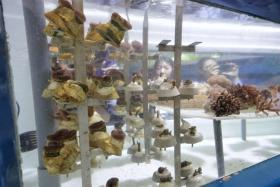Budget-conscious fashionistas go swopping, not shopping
Second-hand garments get new lease of life through swopping events
A Prada bag and a wedding dress are some items sold at a Swapaholic event - for $30.
Swapaholic, which bills itself as Singapore's first fashion swopping platform, has been helping the budget-conscious to swop their clothes collection for others.
They can do so at events organised by the company since October 2016. The next swop takes place in Earth Fest 2018 at Marina Barrage this Sunday.Swoppers can offer up to 20 items to get points - based on the items' condition, style and brand - that can then be used to select items from other swoppers.
"We are in the era of OOTDs (Outfits Of The Day) and social media - people don't want to wear the same things again and again, so we aim to maximise the lifespan of clothes," said Swapaholic founder Raye Padit, 29.
Mr Pandit, who used to have his own fashion line, wanted to tackle overproduction and waste in the industry.
"If I want to be part of fashion, I don't want to be part of the problem but be part of the solution," he said.
Interest in the events has been growing - about 150 swoppers have turned up at recent events.
Miss Sue-Ann Chng, 31, a marketing manager at Facebook, has been to four Swapaholic events. One of her finds was a black evening gown, which she later swopped when she realised she had nowhere to wear it to.

She said: "It is fun and environmentally friendly, I don't buy much new stuff any more."
Major brands have also started recycling initiatives.
H&M offers discount coupons for their customers' second-hand garments. In Singapore, it collected 7,074kg of garments and textiles in 2013 and 2014, with the number hitting 114,417kg last year.
Second-hand fashion portal Refash has also expanded to meet demand. Launched in 2016, it now has three stores in Singapore and two in Malaysia. The stores accept only clothes in good or "like new" condition.
Refash founder Aloysius Sng, 29, told TNP: "Before we started, people told me it was a crazy idea. Naysayers said that it would be hard in Singapore, especially during festive periods, such as Chinese New Year, when people buy new clothes.
On Jan 21, Refash will work with The Luggage Market - where sellers can sell second-hand apparel from their luggage bags - to buy leftover clothes at the latter's eventat The Adelphi.
Luggage Market co-founder Elaine Ong, 30, said: "People are buying more than what they need and factories are producing more to meet the insatiable demand. We hope The Luggage Market can play a part to improve the situation."
Get The New Paper on your phone with the free TNP app. Download from the Apple App Store or Google Play Store now


